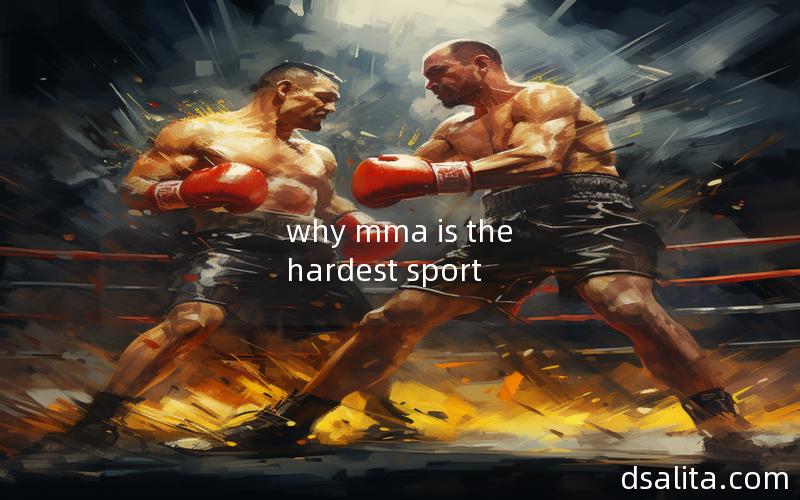Mixed Martial Arts (MMA) has gained immense popularity in recent years, captivating audiences with its intense and brutal nature. It is widely regarded as one of the hardest sports in the world. This article aims to provide a detailed and comprehensive analysis of why MMA is considered the toughest sport, examining various aspects that contribute to its difficulty.
Physical Demands
MMA requires athletes to possess exceptional physical attributes. Fighters must have a combination of strength, speed, agility, endurance, and flexibility. They need to be proficient in striking, grappling, and submissions, demanding a high level of overall fitness. The training regimen for MMA fighters is grueling, involving intense cardio workouts, weightlifting, and hours of skill development.
Furthermore, the fights themselves are incredibly demanding. Competitors endure multiple rounds of intense physical confrontation, where they are subjected to strikes, takedowns, and submissions. The level of physical punishment sustained in a fight is unparalleled in most other sports.
Mental Toughness
MMA is not just physically demanding; it also requires immense mental strength. Fighters must possess a high level of mental toughness to withstand the pressure, pain, and fatigue that comes with the sport. They need to stay focused, make split-second decisions, and adapt to changing circumstances during a fight.
Additionally, fighters must overcome fear and anxiety. The knowledge that they are stepping into a cage to face an opponent who is determined to defeat them can be mentally challenging. The ability to control emotions and remain composed under extreme stress is crucial in MMA.

Technical Skill
MMA is a multidimensional sport that requires proficiency in various martial arts disciplines. Competitors must be skilled in striking techniques such as boxing, kickboxing, and Muay Thai, as well as grappling arts like Brazilian Jiu-Jitsu and wrestling. The complexity of blending these different styles seamlessly requires years of training and practice.
Moreover, fighters need to be well-versed in defensive techniques to protect themselves from strikes and submissions. They must learn how to evade, block, and counter their opponent’s attacks while simultaneously searching for opportunities to launch their own offensive moves.
Strategy and Game Planning
MMA fights are not just about brute force; they require careful strategizing and game planning. Fighters must analyze their opponent’s strengths and weaknesses, devise a game plan, and adjust their strategy during the fight based on their observations. This mental aspect adds a layer of complexity to the sport.
Strategic decisions in MMA include determining whether to keep the fight standing or take it to the ground, choosing the right time to attack or defend, and exploiting an opponent’s vulnerabilities. These decisions must be made in real-time, often under extreme physical and mental stress.
Injury Risks
MMA carries a high risk of injury due to the nature of the sport. Fighters are constantly subjected to strikes, submissions, and takedowns that can result in broken bones, concussions, torn ligaments, and other severe injuries. The physical toll on the body is significant, and fighters often need to recover from injuries before returning to training and competition.
Despite stringent safety measures, injuries are an inherent part of MMA. The risk of injury further adds to the difficulty of the sport, both physically and mentally.
Weight Management
MMA fighters compete in specific weight classes, and maintaining the required weight can be a challenging task. Fighters often need to cut significant amounts of weight before a fight, which involves strict dieting, dehydration, and intense workouts. This weight management process can be physically and mentally exhausting, adding another layer of difficulty to the sport.
Moreover, fighters must find a balance between cutting weight and maintaining their strength and endurance. Improper weight management can lead to decreased performance, increased injury risk, and long-term health issues.
Competition Level
The level of competition in MMA is exceptionally high. Fighters come from various martial arts backgrounds and have honed their skills for years before stepping into the cage. The sport attracts elite athletes from around the world, making it incredibly challenging to rise to the top.
Furthermore, the unpredictability of MMA adds to the difficulty. One mistake or momentary lapse in concentration can result in a loss, regardless of a fighter’s skill level. The competitiveness and depth of talent in MMA make it one of the hardest sports to excel in.
Conclusion
MMA is undoubtedly one of the toughest sports in the world. Its physical demands, mental toughness requirements, technical skill set, strategic complexities, injury risks, weight management challenges, and high level of competition contribute to its difficulty. It takes a special kind of athlete to succeed in MMA, making it a truly remarkable and grueling sport.

 Dsalita Boxing
Dsalita Boxing






